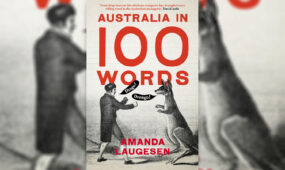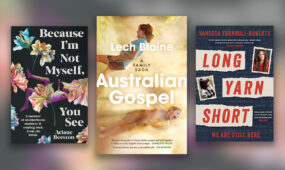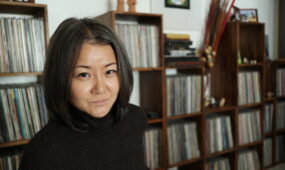This is How We Change the Ending
Books & Poetry
BOOK EXTRACT: Adelaide author Vikki Wakefield’s latest novel is a coming-of-age tale about a 16-year-old boy doing his best to stay invisible amid the chaos around him – until he realises he may be able to make a difference and change his life.

This is How We Change the Ending, which will be published on September 3, follows Wakefield’s previous young-adult novels All I Ever Wanted, Friday Brown, Inbetween Days and Ballad for a Mad Girl, all of which explore the lives of contemporary teenagers.
The extract below is the first chapter of the book, which publisher Text describes as “raw and real, funny and heartbreaking — a story about what it takes to fight back when you’re not a hero”.
——
Dec and Nance are fighting again. I lie awake, listening. It doesn’t upset me as much as it used to — not like when it was Mum and Dec, when I was younger and on my own. Nance can look after herself. With the pillow over my head, their fighting sounds like beatboxing: all hiss and spit.
I toss the pillow aside and lean over the edge of the top bunk. The clock on the table reads nine thirty-six.
Otis and Jake are hard asleep on the bottom bunk, head to toe, curled around each other. My half-brothers, three years and two months old. With the door and window closed, our bedroom reeks of piss and stale breath. Fresh piss or old, I can’t tell. O always stinks like urine or vomit or milk gone sour.
Jake rolls over, talking in his sleep, and Otis moves to fill the space as if they’re two strange sea creatures inside the same shell. Twins. Jake has a bump on his chest and Otis has a dent on his; Nance says they were joined once, but Jake broke away and took a piece of Otis with him.
For fifteen minutes I ignore my aching bladder. They’ll stop fighting if I show my face, but I don’t really want them to stop. Maybe tonight Nance will win.

Author Vikki Wakefield
I throw back my sheet and slide off the bunk. The twins only hear each other — not the fighting, the sirens, the crickets, or the Elvis music coming from Clancy’s next door. Not my feet when they hit the floor.
I push the window up halfway and start peeing through the gap.
‘Hey, Nate.’
There’s a cloud of smoke rising above Nance’s dying hydrangea bush.
‘Jesus, Merrick. Let me finish.’
Obligingly, he looks the other way and takes another drag on his cigarette.
If I had to give a reason for Connor Merrick and me being friends for the last six years, I’d have to say it’s more about proximity than personality. McKee and Merrick, straight after each other on the roll call, except for the times there was another McSomebody. The last picks for team — united by shame — me because I’m lethargic to the point of being comatose, and Merrick because he’s smoked since he was twelve and it’s probably stunted his growth. He lives in the upstairs unit across from ours, but he spends every second week with his mum a couple of suburbs over. He’s a FIFO kid — he flits in and out. FIFO kids have two sets of stuff. I have a FIFO mum. Kids of FIFO mums have less of everything according to the law of diminishing returns.
Merrick always enters and leaves through our window. In the entire six years I’ve known him he has never come to our front door.
‘Can I hang here for a bit?’ he says when I’m finished. ‘Senior’s tossing my room again.’
His old man’s a mean drunk. He throws things around, including Merrick. He usually passes out before midnight, but he’d be hitting his peak about now.
I shrug. ‘Dec and Nance are at it.’
‘You mean…’ He smacks his palms together.
‘Nah. Like, brawling.’
‘Oh.’
I check the twins: still twitching and dreaming. And I’m not getting to sleep anytime soon.
‘We could kill some time at Youth? Might be some fresh meat.’
YouthWorks is the local youth centre, open every night until twelve. Merrick likes going there since he discovered that having a supreme mathematical mind pays massive dividends at the pool table. He looks hopeless with his tiny head and big ears, and sometimes you get meatheads who’ll bet they can take him by slapping a whole pack of smokes on the table. Nobody can beat Merrick. I swear I can see glowing equations swirling above his head when he’s plotting how to pot three colours off the white. Shame he can’t apply the same genius when he’s studying Trig.
Merrick nods. ‘Good call.’
I grab my notebook, slip on my shoes and climb out, leaving the window open just enough for re-entry.
‘Imagine how big your brain might get if you stopped depriving it of oxygen.’
I tuck the notebook inside the waistband of my jeans, at the back. Make sure my T-shirt covers it.
He brushes me off. ‘I gotta slow it down until my head catches up. Or else my skull will crack.’
Plenty of people have tried to crack his skull. Merrick’s brain-smart but street-stupid — he’ll get us both killed someday.
We squeeze between our row of sixteen letterboxes and thirty-two bins, push through the side gate, and head down Whittlesea Road. Three of five street lights are out; the two that work are swarming with bugs. Summer ended a while back, but Bairstal must get the memo late. A few weeks ago, we had six days straight over thirty-five degrees and we all looked like a new species with purple faces and bulging eyes; all we could do was talk less, pant like dogs and sleep under wet sheets.
‘I got sixty-four per cent on my Chem test,’ Merrick says. ‘I’m officially an over-achiever.’
I shake my head. ‘What’d I tell you? What’s the first rule of high school?’

‘Don’t try too hard.’
‘And what’s the second?’
‘Make fun of people who do.’
‘Spoken like a true prodigy,’ I say.
He screws up his nose. ‘Who said that anyway?’
‘The Wolf!’
‘Not that. High school rules.’
‘Channing Tatum. 21 Jump Street.’
‘Oh. Right.’
We’ve been working our way through the second-hand DVD collection at Youth for over four years; we can carry on whole conversations just using movie dialogue. Merrick and I know each other so well, we hardly have anything original left to say.
We stop at the main road between Bairstal and Rowley Park. Two Subarus are nudging each other at the lights. We’ve got time to cross, but if one of them jumps the green we’ll be skids. I throw out my arm to hold Merrick back.
He makes an L sign on his forehead. ‘Give me an Evo any day.’
‘Like you could ever afford an Evo.’ We cross.
‘I’d tune up a Ralliart. Same motor, only detuned,’ he says.
‘Nah, it’s a whole lot different. Chassis, I reckon. Brakes, too.’
‘Point is it’ll look like a shitbox until they’re eating dust. Now that would be ironic.’
‘No. It really wouldn’t.’ I’ve tried to demonstrate irony about a hundred times and he still doesn’t get it. ‘Anyway, face it. I’ll never get my licence.’
‘Why not? I can’t wait.’
‘Think about it — I have to log seventy-five hours, we don’t have a car, and a driving instructor costs sixty-five bucks an hour. That’s more money than I could scrape together in six months. Which leaves one option — steal a car and fake a logbook, but then I’d still have to come up with the money for the test. In that time, I reckon the person whose car I stole might have noticed their car is missing and I’ll get busted for boosting and the licence I never got will be suspended for twelve months. It’s a vicious circle.’
‘Oh. Yeah, I guess.’
‘For the record, that’s not ironic either.’
‘I know, but — come on. Tell me you don’t fantasise about your dream car.’
‘Whatever blows your hair back,’ I say.
‘My Evo will blow your hair off.’
‘It’s a dream car — it won’t blow anything any more than your dream girl will.’
He thinks for a moment. ‘We should definitely fake the logbook.’
‘Sure, but then you’d be even more of a danger to society than you already are.’
Merrick mutters to himself, then changes the subject. ‘Hey — when you marry Nance, you could adopt me,’ he says, as if the thought just occurred to him. Only it hasn’t, because that thought occurs to him frequently. ‘Do you think she’ll still be breastfeeding then?’
I give him a dead arm. ‘Shut up. Anyway, she stopped.’
‘Bummer.’
I add, ‘O has an unpredictable bite reflex.’
‘I’d still do her.’
‘Mate, you wouldn’t know what to do with it if it shouted instructions.’
‘Yeah, I would…’
I grab one of his elephant ears and twist it until the cartilage pops. ‘Get your hand off it.’
‘Hey!’ He rubs his ear with one hand and fumbles for a cigarette with the other. ‘No wonder they stick out.’
I don’t like him talking about Nance that way. Yeah, it’s weird having a stepmother only eight years older than me, but no weirder than him having a dad ancient enough to be his grandfather. Merrick senior is seventy and my old man’s half that age. Merrick’s almost seventeen, six months older than me (though he doesn’t act like it), and he thinks about sex all the time — about doing it, about watching others do it, about not having someone to do it with. Somehow he does this without mentioning that he’s never actually done it. Even if I wanted to, which I don’t, I couldn’t. I have no privacy. I can’t even take a piss without someone knowing.
‘Did you know that organisms reproduced asexually for billions of years before sex came along?’ I say. ‘No mess, no fuss, no broken hearts — boom, clone yourself and get on with the important stuff.’
‘What’s more important than sex?’ He makes a suction-ing noise with his tongue.
‘Survival.’
Merrick points to my groin. ‘You should get that looked at. You’re not normal.’
I shake my head and walk on ahead.
Merrick got no challengers at the pool table. I shot hoops in the Rage Cage for a while, but my court buddies Cooper and Deng were no-shows and the bugs were swarming so bad I had to pick flying ants out of my pants. I sat scribbling in my notebook until Macy, the director, kicked us out.
I got a few words down. Not great ones, but that’s not really the point. Mostly they’re just random scenes, fragments of sentences or long letters to nobody. Ideas that probably wouldn’t make sense to anyone but me. They’re out of control, so they’re not poems; they have no music, so they’re not lyrics. I suppose they’re a kind of alternative reality, a possible reality more than a parallel universe. Like it could happen to me, instead of a different version of me. My notebooks are like my own private well and my words are like stones: I drop them in the well so I don’t have to carry them around. I need the well.
It keeps me from self-destructing.
Sometimes I wonder what might happen if I just threw stones instead.
When we get back to the flats, Merrick waves and disappears.
Nance is sitting on the verandah, sifting dirt through her toes. It’s just past midnight. She’s wearing a stained oversized T-shirt and her long brown hair is twisted on top of her head. She looks up. Her wide grey smiley eyes aren’t smiling. Her expression is so blank it’s scary.
‘I thought you were in bed, bub.’
I don’t know why she calls me that. I love it. I hate it.
‘I was. I snuck out with Merrick. Went to Youth.’
‘I would too, if I could.’ She stands, dusting off her arse.
I know what she means. Nobody should be as old as she is at twenty-four. Dad — Dec — has locked her out again because that’s what he does when she won’t let up. He puts her out like a cat. When he’s calmed down he’ll serenade her with his guitar until she falls for him again. And she does. Every time.
A hacking cough from the balcony above makes us jump.
‘Hey, Margie,’ she calls, and waves. ‘It’s just Margie upstairs.’
Nance names everybody according to where they live: Clancy next door, Margie upstairs, Kath on the corner, the Merricks across the way. She says it’s because she’s from the country, where nobody has street numbers or letterboxes.
Margie flicks her ash over the railing and coughs in reply. Dec tolerates Margie being upstairs because she minds her own business. She has a beagle cross called Kelly; Kelly has a chain smoker’s cough too, and she’s so fat her belly almost touches the ground. I haven’t seen her downstairs in years, even though Nance said she could run around our yard because we hardly ever use it. The flats aren’t pet-friendly, but everyone keeps Margie’s secret because she loves that dog more than life. They sit at the top of the stairs every evening and Margie feeds Kelly people-food from a fork. (I worry about Kelly. I worry about the stains on our ceiling. I wonder where she shits and I’ve googled ‘do dogs need sunshine’.)
‘Dec in there?’
Nance shakes her head. ‘He went out.’
This is a switch-up. ‘With the twins locked in?’
‘He probably thought you were there.’ She smiles. ‘They’ve got each other. They only need me for daytime.’
‘I left the window up a crack. I’ll open up for you.’
‘He’ll kill you if he finds out you leave it open.’
‘I know.’
‘Wait.’ She grabs my hand. ‘Read to me. Something happy.’
Nance is the only one I can read to, but I have to be careful what I pick. If I choose right, she gets this look like I’ve taken her far away and she likes it there. When she first came to live with us, I told her she could stay for a while but she’d have to leave when my real mum came home. She’s had plenty of opportunity to score back the point, but that’s not her style.
‘I started something new. It’s about Otis.’
She nods. ‘What’s it called?’
I breathe in and pull out my notebook. This one’s falling apart and almost full. It weighs twice as much as a new one; it always surprises me that ink can be so heavy.
‘For Otis.’ Another breath. I riffle the pages.
‘Read it,’ she says, so low I’m not sure I heard her right.
‘For Otis.’ I clear my throat.
—They say
a piece of you is missing—
I stop. The last thing I want to do is make Nance cry.
‘What comes next?’

Get InReview in your inbox – free each Saturday. Local arts and culture – covered.
Thanks for signing up to the InReview newsletter.
‘That’s it. I’ve only got the beginning.’
Nance is quiet for a long time. She can’t tell I lied. Her eyes are shining, or maybe they’re just reflecting the sensor light.
‘Let me know how it ends,’ she says.
Extract from This is How We Change the Ending, by Vikki Wakefield, $19.99, published by Text Publishing and available from September 3.
Support local arts journalism
Your support will help us continue the important work of InReview in publishing free professional journalism that celebrates, interrogates and amplifies arts and culture in South Australia.
Donate Here




